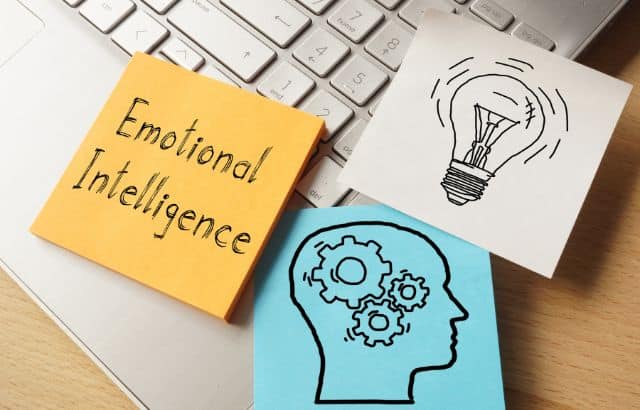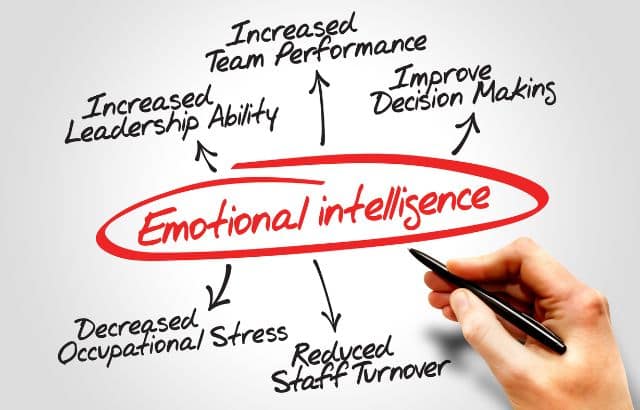Emotional intelligence is the ability to recognize and manage your own emotions, as well as the emotions of others. It’s a crucial skill in the workplace, as it can impact communication, teamwork, and leadership. In this guide, we’ll explore why emotional intelligence matters and provide tips for improving your own emotional intelligence.
Table of Contents
What is Emotional Intelligence?
Emotional intelligence is the ability to recognize and understand your own emotions, as well as the emotions of others. It involves being able to manage your emotions in a healthy way, and to use that understanding to navigate social interactions and relationships. Emotional intelligence is a key factor in workplace success, as it can impact communication, teamwork, and leadership.
The Benefits of Emotional Intelligence in the Workplace.
Developing emotional intelligence can have numerous benefits in the workplace. Employees with high emotional intelligence are often better at communicating with others, resolving conflicts, and building strong relationships with colleagues and clients. They are also more likely to be effective leaders, as they can understand and respond to the needs and emotions of their team members. Additionally, individuals with high emotional intelligence are often better at managing stress and by learning how be positive, maintaining a positive attitude, which can lead to increased productivity and job satisfaction.
How to Improve Your Emotional Intelligence.
Improving your emotional intelligence can be a gradual process, but there are several steps you can take to start developing this important skill. One key step is to become more self-aware, which involves recognizing your own emotions and how they impact your behavior. You can also work on improving your social awareness, which involves understanding the emotions and needs of others. Other strategies for improving emotional intelligence include practicing empathy, managing stress effectively, and developing strong communication skills. With time and effort, you can become more emotionally intelligent and achieve greater success in the workplace.
Tips for Practicing Emotional Intelligence in the Workplace.
Practicing emotional intelligence in the workplace can lead to better relationships with colleagues, improved communication, and increased productivity. One way to practice emotional intelligence is to actively listen to others and try to understand their perspective. It’s also significant to manage your own emotions and reactions, especially in high-pressure situations. Taking a moment to pause and reflect before responding can help you respond in a more thoughtful and effective way. Additionally, showing empathy and understanding towards others can help build trust and strengthen relationships.
The Role of Emotional Intelligence in Leadership.
Emotional intelligence is especially significant for leaders in the workplace. Leaders who possess emotional intelligence are better equipped to manage their own emotions and reactions, as well as those of their team members. They are able to communicate effectively, build strong relationships, and inspire and motivate their team. Leaders with high emotional intelligence are also better able to handle conflict and difficult situations, leading to a more positive and productive work environment.
Workplace emotional intelligence FAQs and Answers:
-
FAQ: How can I improve my emotional intelligence in the workplace?
- Answer: Start by increasing self-awareness through reflection and feedback. Practice empathy by actively listening to others and seeking to understand their perspectives. Work on managing your emotions effectively, especially in challenging situations, and focus on building positive relationships with colleagues.
-
FAQ: What role does emotional intelligence play in conflict resolution?
- Answer: Emotional intelligence is essential for navigating conflicts constructively. By understanding and managing emotions, individuals can approach conflicts with empathy and perspective-taking, facilitating better communication, compromise, and resolution.
-
FAQ: How can leaders foster emotional intelligence in their teams?
- Answer: Leaders can promote emotional intelligence by providing training and resources, leading by example, and creating a supportive and inclusive work environment. Encouraging open communication, recognizing and rewarding emotionally intelligent behaviors, and offering mentorship and coaching are also effective strategies.
Workplace emotional intelligence Quotes
“Emotional intelligence is the cornerstone of effective communication and collaboration in the workplace.”
Explanations:
This quote emphasizes the pivotal role of emotional intelligence in fostering meaningful connections and productive relationships among coworkers. It suggests that understanding and managing emotions is essential for successful communication, conflict resolution, and teamwork within organizational settings.
Strategy:
To cultivate emotional intelligence in the workplace, organizations can prioritize training and development programs that focus on enhancing skills such as active listening, empathy, and nonverbal communication. By providing employees with the tools and resources to recognize and regulate emotions effectively, organizations can create a more harmonious and collaborative work environment.
Execution:
Implement workshops, seminars, or online courses designed to educate employees about the importance of emotional intelligence and provide practical strategies for improving interpersonal skills. Encourage open dialogue and create opportunities for employees to practice emotional intelligence techniques in team-building exercises, role-playing scenarios, or real-life workplace situations. Additionally, incorporate emotional intelligence assessments or feedback mechanisms to track progress and reinforce learning outcomes over time.
“Emotional intelligence shapes the fabric of workplace culture, weaving threads of empathy and understanding.”
Explanations:
This quote highlights the profound impact of emotional intelligence on shaping the culture of an organization. It suggests that by cultivating empathy and understanding, emotional intelligence fosters a supportive and inclusive workplace environment where individuals feel valued, respected, and empowered to thrive.
Strategy:
To embed emotional intelligence into workplace culture, organizations can integrate it into their core values, policies, and practices. This involves fostering leadership behaviors that prioritize empathy, creating opportunities for meaningful connections among employees, and promoting a culture of open communication and psychological safety.
Execution:
Establish training programs and workshops focused on developing emotional intelligence skills at all levels of the organization, from frontline staff to senior leadership. Encourage the implementation of regular feedback mechanisms and recognition programs that celebrate emotionally intelligent behaviors. Foster mentorship and coaching relationships to support continuous growth and development in emotional intelligence. Additionally, lead by example by demonstrating empathy, active listening, and compassion in all interactions.
“Emotional intelligence is the key that unlocks doors to effective conflict resolution and collaboration in the workplace.”
Explanations:
This quote emphasizes the transformative power of emotional intelligence in navigating conflicts and fostering collaboration within teams. It suggests that by fostering self-awareness and empathy, individuals can resolve disputes constructively and work together toward shared goals, driving organizational success.
Strategy:
To harness the power of emotional intelligence for conflict resolution and collaboration, organizations can provide training programs that equip employees with the skills to manage emotions, communicate effectively, and build trust. By creating a culture that values emotional intelligence, organizations can empower employees to address conflicts proactively and collaborate productively.
Execution:
Offer workshops and seminars that focus on conflict resolution techniques, such as active listening, perspective-taking, and negotiation skills. Encourage the establishment of clear communication channels and conflict resolution processes within teams and departments. Provide opportunities for team-building activities and cross-functional collaboration to strengthen relationships and foster a sense of unity. Celebrate instances of effective conflict resolution and collaboration to reinforce the importance of emotional intelligence in achieving organizational goals.
“Emotional intelligence serves as a guiding light, illuminating pathways to effective leadership and team performance.”
Explanations:
This quote underscores the critical role of emotional intelligence in leadership effectiveness and team performance. It suggests that by cultivating emotional intelligence, leaders can inspire trust, motivate others, and create a positive work environment that fosters high levels of engagement and productivity.
Strategy:
To develop emotional intelligence in leaders and teams, organizations can provide leadership development programs that focus on self-awareness, empathy, and relationship management. By equipping leaders with the skills to understand and connect with others, organizations can empower them to lead with authenticity, integrity, and resilience.
Execution:
Offer leadership training programs that incorporate emotional intelligence assessments, self-reflection exercises, and interactive workshops. Provide coaching and mentorship opportunities for emerging leaders to enhance their emotional intelligence skills and leadership capabilities. Foster a culture of feedback and continuous learning, where leaders and team members are encouraged to seek opportunities for personal and professional growth. Encourage leaders to lead by example by demonstrating empathy, humility, and emotional resilience in their interactions with others.
“Emotional intelligence empowers individuals to harness the power of emotions, turning them into catalysts for personal and professional growth.”
Explanations:
This quote highlights the transformative potential of emotional intelligence, emphasizing its ability to empower individuals to leverage their emotions as a source of strength and resilience. It suggests that by developing emotional intelligence, individuals can navigate challenges, adapt to change, and unlock new opportunities for advancement and fulfillment.
Strategy:
To foster emotional intelligence in individuals, organizations can provide training and development programs that focus on self-awareness, self-regulation, and empathy. By creating a supportive learning environment that encourages self-reflection and growth, organizations can empower individuals to enhance their emotional intelligence and thrive in both their personal and professional lives.
Execution:
Offer workshops, seminars, or online courses that introduce participants to the core concepts of emotional intelligence and provide practical strategies for developing these skills. Encourage individuals to engage in self-assessment exercises and reflective practices to deepen their understanding of their emotions and behavior patterns. Provide opportunities for peer support, mentorship, and coaching to facilitate ongoing learning and development in emotional intelligence. Celebrate milestones and achievements along the journey toward greater emotional intelligence, recognizing the positive impact it has on individual well-being and organizational success.
Final Words
Hirav Shah is a guide that explores the importance of emotional intelligence in the workplace and provides tips for improving it. Emotional intelligence involves recognizing and managing your own emotions, as well as understanding the emotions of others. It is a crucial skill for effective communication, teamwork, and leadership. Developing emotional intelligence can lead to better relationships with colleagues, improved communication, and increased productivity. To improve emotional intelligence, one can become more self-aware, practice empathy, manage stress effectively, and develop strong communication skills. Emotional intelligence is especially important for leaders, as it allows them to manage their own emotions and those of their team members, communicate effectively, and handle conflict and difficult situations. With effort and practice, anyone can improve their emotional intelligence and achieve greater success in the workplace.





























